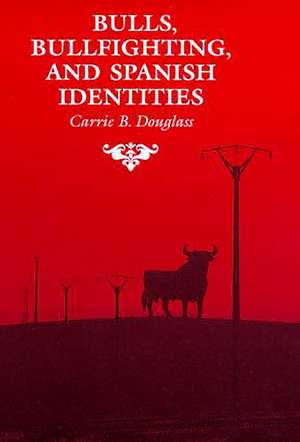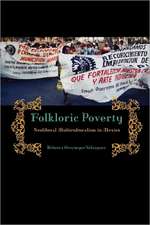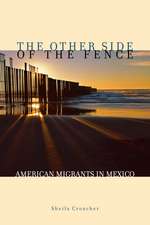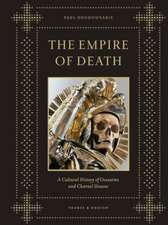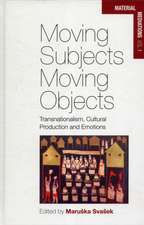Bulls, Bullfighting, and Spanish Identities
Autor Carrie B. Douglassen Limba Engleză Paperback – apr 1999
The matador flourishes his cape, the bull charges, the crowd cheers: this is the image of Spain best known to the world. But while the bull has long been a symbol of Spanish culture, it carries more meaning than has previously been recognized. In this book, anthropologist Carrie B. Douglass views bulls and bullfighting as a means of discussing fundamental oppositions in Spanish society and explains the political significance of those issues for one of Europe's most regionalized countries.
In talking about bulls and bullfighting, observes Douglass, one ends up talking not only about differences in region, class, and politics in Spain but also about that country's ongoing struggle between modernity and tradition. She relates how Spaniards and outsiders see bullfighting as representative of a traditional, irrational Spain contrasted with a more civilized Europe, and she shows how Spaniards' ambivalence about bullfighting is actually a way of expressing ambivalence about the loss of traditional culture in a modern world. To fully explore the symbolism of bulls and bullfighting, Douglass offers an overview of Spain's fiesta cycle, in which the bull is central. She broadly and meticulously details three different fiestas through ethnographic fieldwork conducted over a number of years, delineating the differences in festivals held in different regions.
She also shows how a cycle of these fiestas may hold the key to resolving some of Spain's fundamental political contradictions by uniting the different regions of Spain and reconciling opposing political camps--the right, which holds that there is one Spain, and the left, which contends that there are many. Bulls, Bullfighting, and Spanish Identities is an intriguing study of symbolism used to examine the broader anthropological issues of identity and nationhood. Through its focus on the political discourse of bulls and bullfighting, it makes an original contribution to understanding not only Spanish politics but also Spain's place in the modern world.
In talking about bulls and bullfighting, observes Douglass, one ends up talking not only about differences in region, class, and politics in Spain but also about that country's ongoing struggle between modernity and tradition. She relates how Spaniards and outsiders see bullfighting as representative of a traditional, irrational Spain contrasted with a more civilized Europe, and she shows how Spaniards' ambivalence about bullfighting is actually a way of expressing ambivalence about the loss of traditional culture in a modern world. To fully explore the symbolism of bulls and bullfighting, Douglass offers an overview of Spain's fiesta cycle, in which the bull is central. She broadly and meticulously details three different fiestas through ethnographic fieldwork conducted over a number of years, delineating the differences in festivals held in different regions.
She also shows how a cycle of these fiestas may hold the key to resolving some of Spain's fundamental political contradictions by uniting the different regions of Spain and reconciling opposing political camps--the right, which holds that there is one Spain, and the left, which contends that there are many. Bulls, Bullfighting, and Spanish Identities is an intriguing study of symbolism used to examine the broader anthropological issues of identity and nationhood. Through its focus on the political discourse of bulls and bullfighting, it makes an original contribution to understanding not only Spanish politics but also Spain's place in the modern world.
Preț: 203.74 lei
Nou
Puncte Express: 306
Preț estimativ în valută:
38.99€ • 40.56$ • 32.19£
38.99€ • 40.56$ • 32.19£
Carte tipărită la comandă
Livrare economică 14-28 aprilie
Preluare comenzi: 021 569.72.76
Specificații
ISBN-13: 9780816516520
ISBN-10: 0816516529
Pagini: 245
Dimensiuni: 156 x 235 x 18 mm
Greutate: 0.46 kg
Ediția:1
Editura: University of Arizona Press
Colecția University of Arizona Press
ISBN-10: 0816516529
Pagini: 245
Dimensiuni: 156 x 235 x 18 mm
Greutate: 0.46 kg
Ediția:1
Editura: University of Arizona Press
Colecția University of Arizona Press
Notă biografică
Carrie B. Douglass lived for eight years in Barcelona, Spain, during the transition from the Franco regime to democracy in the 1970s. She is presently an assistant professor of anthropology and Spanish at Mary Baldwin College in Staunton, Virginia.
Recenzii
“As a detailed explanation of the workings—symbolic and practical—of the bullfighting system and of how these ludic events are reconfigured in different parts of Spain, the book is authoritative and demonstrates careful archival research, excellent control of the theme literature, and solid fieldwork.”—Choice
“Readers who enjoy festival will not be disappointed—Douglass takes them by the hand and never loses her lucidity amidst the merrymaking.”—Journal of Anthropological Research
“An important study, one which promises to be widely discussed as Spain continues its uneven movement toward modernity.”—Virginia Quarterly Review
“Readers who enjoy festival will not be disappointed—Douglass takes them by the hand and never loses her lucidity amidst the merrymaking.”—Journal of Anthropological Research
“An important study, one which promises to be widely discussed as Spain continues its uneven movement toward modernity.”—Virginia Quarterly Review
